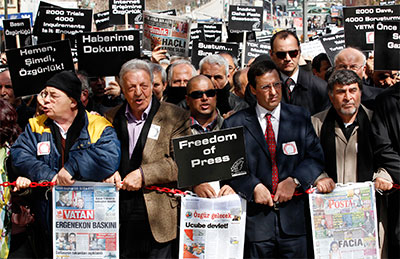In Istanbul, the trial of several suspects in the case of Odatv, an ultranationalist website harshly critical of the government, continues to great consternation. When the case began in early 2011, a dozen journalists were charged, 10 of whom were incarcerated. The prosecution said Odatv staffers, along with prominent investigative reporters Ahmet Şık and Nedim Şener, were involved in the alleged Ergenekon plot–a supposed large-scale conspiracy to overthrow the government of Prime Minister Recep Tayyip Erdoğan.
Police raided the Odatv office and confiscated books, notes, archive tapes, and equipment. The officers also copied hard drives, according to CPJ research. The contents of these hard drives would later become the prime evidence against the journalists, as would columns and news reports carried by the website–some articles simply reprinted from other media outlets. The charges against the journalists include “aiding an armed terrorist organization,” “inciting hatred and hostility,” and “obtaining confidential state security documents.” But even though authorities claimed they had serious evidence to prove those accusations, such evidence has so far not been presented in court. All of the defendants deny the charges against them.
The evidence included in the indictment, which was obtained and reviewed by CPJ, consists of journalistic articles; wiretapped conversations between staffers discussing press coverage; email correspondence between Odatv journalists and news sources; and questionable Word files that both the defendants and expert analysts say had been planted in Odatv computers using a Trojan virus.
In the months since the initial arrests, defendants have been released one or two at a time, to be tried on bail. Of the initial 10 journalists in custody, two remain in prison for a 21st month in a row. None have been fully acquitted and could be re-arrested upon conviction. We believe that the charges against them should be dropped and all should be released unconditionally.
As the trial proceeded from November 22–and some defendants, but not others, were released–journalists, including those freed, began scratching their heads as to what altered the court’s attitude. Why were they being released now–as opposed to months earlier–when none of the alleged evidence against them had changed?
Müyesser Yıldız, one of the journalists conditionally released in June, told CNN Turk that she was puzzled as to why she had been kept in prison for over a year, then let go suddenly with no additional evidence presented either in her favor or against her. “Nothing has changed in our case dossiers since March [2011],” she said.
The latest conditional release in the Odatv case took place on Friday. But the court still holds Odatv publisher Soner Yalçın–who has been vocal about the injustice he and his staffers have suffered–and writer Yalçın Küçük.
“They are kept inside for revenge,” prominent journalist Ahmet Şık, who was conditionally released in March, told CPJ. “There is no logic [in the court’s actions], this is a political trial. I do not know why I am outside… I do not think the court would release anybody without receiving orders,” he said. Şık alleges that such orders come from a group in Turkey’s police and judiciary affiliated with the charismatic and influential cleric Fethullah Gülen. Şık’s own inclusion as a suspect in the Odatv case stems from his unpublished book, The Imam’s Army, a draft of which was reportedly found on Odatv‘s computers. The book is highly critical of the Gülen community, which, according to the journalist, had infiltrated powerful structures in Turkey. Odatv has likewise been critical of the Gülen community.
In a separate case, Şık is being criminally tried for remarks he made upon his March 12 release from Istanbul’s Silivri prison. He is charged with “threatening and identifying judges and prosecutors as targets for terror organizations”–charges that carry up to seven years in jail if convicted. His trial started on September 13. The charges stem from this statement he made to journalists: “Incomplete justice is not going to bring justice and democracy. About 100 journalists are still in prison. … The police officers, prosecutors, and judges who plotted and carried out this complot will go to prison. Justice will come when they enter this prison,” according to news reports.
This new criminal case against Şık demonstrates the fundamental flaw of Turkey’s legal system–it enables authorities to broadly interpret criticism as criminal activity. Despite some cosmetic changes to individual laws that the government has made in recent months, fundamental legal reform is lacking. Until it is in place, journalists who criticize authorities will be vulnerable to politically motivated prosecution. Self-censorship will become more prevalent than it is today as journalists would rather be safe than risk incurring the wrath of those equipped with the tools to put them behind bars.
While Odatv‘s editorial style of being openly anti-government, provocative, even sensationalist may not qualify as quality journalism, it does not amount to terrorism or justify staffers’ incarceration. If Erdoğan is genuine in his stated commitment to freedom of the press and freedom of expression, he will publicly condemn the imprisonment of journalists and ensure that writing or speaking critically of authorities does not constitute a ticket to jail in Turkey.
